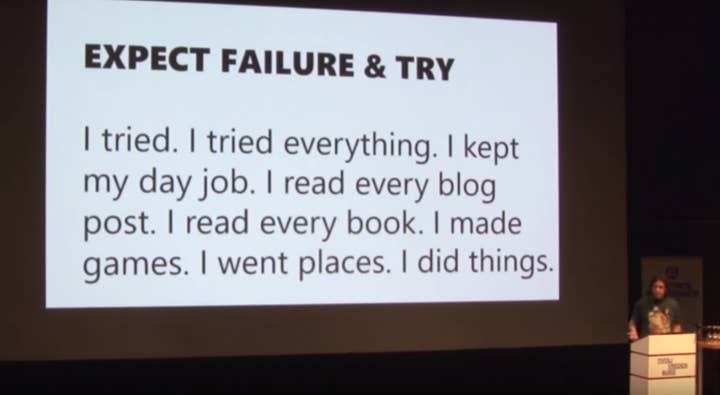Vlambeer: "It's important to make sure that you can fail"
Rami Ismail addresses the 'Indiepocalypse', and tells first time developers to accept and embrace failure
Whether or not the 'Indiepocalypse' actually comes to pass, any developer approaching its first project should expect to fail. Indeed, according to Vlambeer's Rami Ismail, embracing that failure is now the best possible survival strategy.
Speaking at the Control Conference in Utrecht, Holland, Vlambeer's charismatic co-founder issued a challenge to his audience, many of whom were either studying to be game developers or very early in their careers.
"I want to talk about failure," he said, mentioning a prior talk by SteamSpy's Sergey Galyonkin, which explored the potential market contraction some have labelled the 'Indiepocalypse.'
"Very specifically, I want to talk about your failure. If that's something you don't want to listen to, this is the point you can get up and leave the hall. There are two exits, one on either side."
"I've flown to about 220 places in which people are making indie games. Not a lot of them earn money, and those that do don't earn very much"
Ismail addressed and confirmed certain factors that have allowed the Indiepocalypse concept to gain traction, specifically the impact that the huge volume of product has on the value of any given one. He used photography as a metaphor: the iconic image of the US flag being raised on Iwo Jima earned its creator, Joe Rosenthal, around $130,000, adjusted for inflation. Now, though, when almost everyone has access to a camera of some type or technical sophistication, the difference in commercial value between amateur and professional photography is almost non-existent.
"So, basically, there's bad news," Ismail said. "Indie games are like photography. More people have access to game development and design than ever before. Thousands of people are making indie games around the world today, and I've visited a lot of them.
"I've flown to about 220 places in which people are making indie games... Not a lot of them earn money, and those that do don't earn very much - if any at all. And only a very small amount of the people that make money earn enough to make a living."
This is a neat summary of the forces that some believe will lead to an 'Indiepocalypse', but while Ismail recognised that these pressures exist, he reminded the audience that indies have always been under varying degrees of pressure. "Whether it's now harder doesn't really matter. All that matters is that you truly understand that being an independent developer is hard, and that very likely you're going to fail."

There are, of course, many successful indies, and Ismail listed some of the more prominent examples: Davey Wreden, who created The Stanley Parable, and is now enjoying rapturous praise and success for The Beginner's Guide; Supergiant's Jen Zee, whose art direction supplied Bastion and Transistor with so much personality; Lucas Pope, whose project after Papers Please, Obra Dinn, will have a self-imposed 1-bit art style.
These examples can be used as proof that indie success is possible, but Ismail argued that this is an example of "survivorship bias." It is just as likely that the attention given to games by people like Wreddon, Pope and Zee will be make it more difficult for other games to find an audience. And just like Vlambeer, the advantages and skills they now possess were earned from mistakes and failures along the road.
"For your first indie game, I want you to adjust your goals. I want you to prepare for failure"
"So you don't have to worry too much about failure," he said. "You should actually just set yourself up for failure, because, honestly, it's probably going to happen anyway. It's important to make sure that you can fail.
"So, for your first indie game, I want you to adjust your goals. I want you to prepare for failure. It is going to fail. But I want you to create for success. I want you to create a thing that you can be proud of, that you can stand behind.
"And most importantly, I want you to build a space for your own work. And what that means is I want you to make a thing, and start talking about it, and start gathering people around you that like it. That like it because of the thoughts you have. That like it because of your art style. That like it for any reason. I want you to make that space, because that space is important to you.
"Let's try making a first game and learn and gain as much as we can, and then survive the critical or commercial or technical failure that your first game is going to be, because it's going to suck.
"And then you get started on number two."
This is a condensed summary of Ismail's full talk, which can be found in its entirety on the Control500 website.

